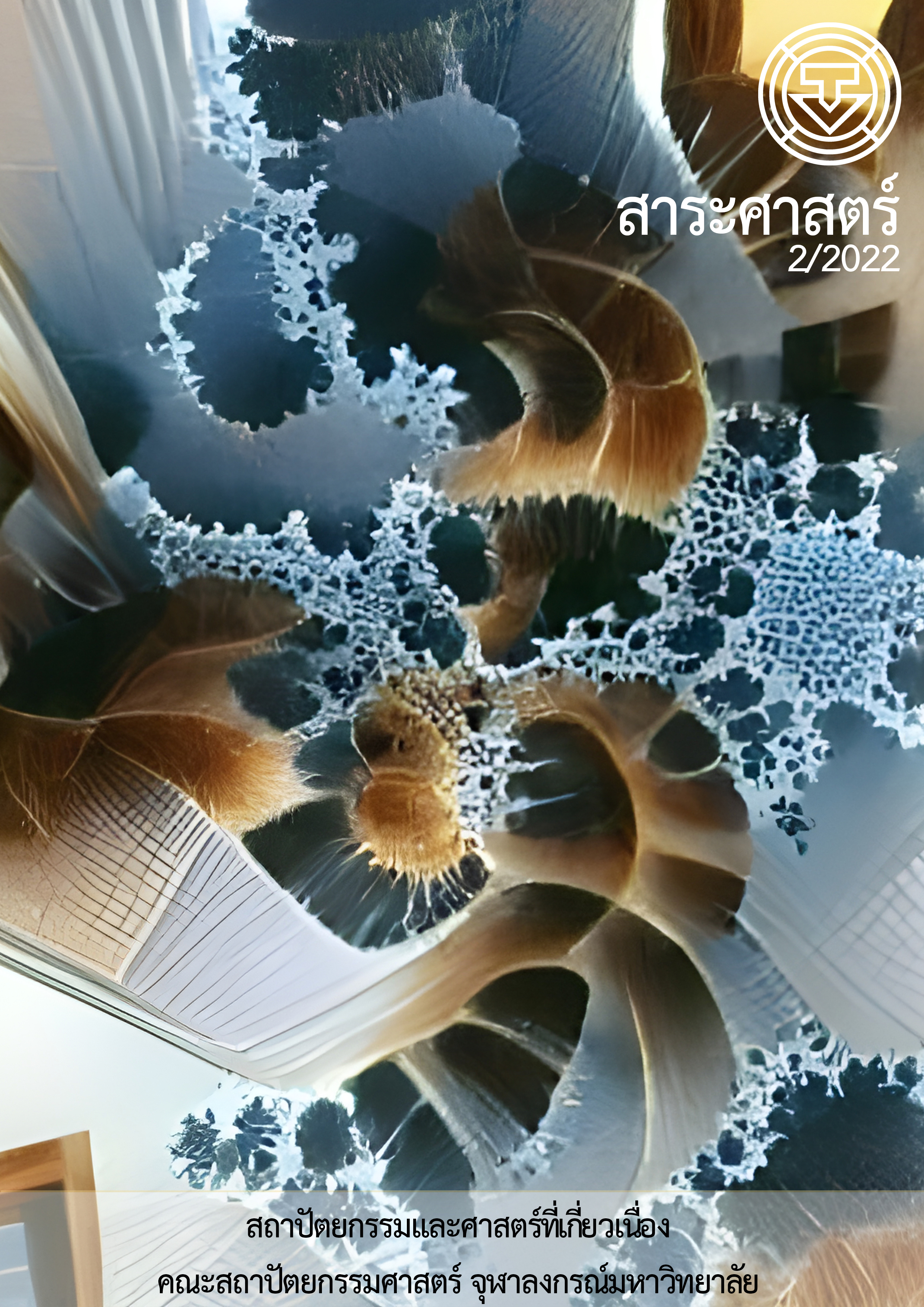การปรับตัวเพื่อความอยู่รอดในภาวะวิกฤตโควิด-19 ระหว่าง พ.ศ. 2563-2564 ของโรงแรมในเขตพัทยาเหนือกรณีศึกษาโรงแรมที่มีการบริหารแบบอิสระขนาดเล็กและขนาดกลาง
Main Article Content
บทคัดย่อ
สถานการณ์การแพร่ระบาดของโควิด-19 ส่งผลกระทบต่อภาคธุรกิจอย่างรุนแรงโดยเฉพาะธุรกิจภาคการท่องเที่ยวและการบริการที่ได้รับผลจากการหดตัวลงของจำนวนนักท่องเที่ยวทำให้เสียรายได้ซึ่งเมืองที่พึ่งพาเศรษฐกิจการท่องเที่ยวเป็นหลักอย่างพัทยาได้รับผลกระทบของโรงแรมแต่ละขนาดแต่ละด้านต่างกัน จึงต้องมีการปรับตัวด้านต่าง ๆ เพื่อการดำเนินการธุรกิจในช่วง
โควิด-19 และการลดผลกระทบจากสภาวะดังกล่าว ดังนั้นงานวิจัยฉบับนี้จึงมุ่งเน้นศึกษาการใช้กลยุทธ์การปรับตัวเพื่อดำเนินธุรกิจอย่างต่อเนื่องโดยทำการศึกษาผ่านกรณีศึกษา 4 โรงแรมที่มีการบริหารแบบอิสระที่มีขนาดแตกต่างกัน ทั้งนี้ มีการรวบรวมข้อมูลจากการสัมภาษณ์ผู้ประกอบการเพื่อสรุปบทเรียนสำคัญในการปรับตัวเพื่อนำมาเปรียบเทียบและสรุปกลยุทธ์ที่สามารถทำให้โรงแรมดำเนินธุรกิจต่อได้หรือมีการฟื้นตัว
ผลการศึกษาพบ 3 กลยุทธ์ในการปรับตัวที่ทำให้สามารถดำเนินธุรกิจต่อได้ตลอดช่วงสถานการณ์วิกฤต 1) การจัดระเบียบค่าใช้จ่ายโดยการตัดส่วนธุรกิจเสริมสำหรับโรงแรมขนาดกลาง แต่โรงแรมขนาดเล็กที่มีการขายห้องพักเป็นรายได้หลักต้องเพิ่มช่องทางของรายได้ 2) การปรับราคาห้องพักเพื่อดึงดูดกลุ่มลูกค้าทั้งให้มีจำนวนผู้เข้าพักมากขึ้นและใช้เวลาการเข้าพักนานขึ้นและ 3) กลยุทธ์การสร้างจุดขายใหม่โดยการขยายกลุ่มเป้าหมายเป็นกลุ่มที่เฉพาะมากขึ้นและหลากหลายโดยการทำกลุ่มเป้าหมายหลักและรอง จากนั้นจึงปรับปรุงโรงแรมเพื่อให้สอดคล้องกับกลุ่มเป้าหมายควบคู่ไปกับการดำเนินการตามนโยบายภาครัฐอย่างเคร่งครัดในการสร้างความมั่นใจและฟื้นฟูธุรกิจเพื่อให้สามารถดำเนินธุรกิจต่อไปได้
การวิจัยนี้แสดงให้เห็นถึงกลยุทธ์และแนวคิดสำคัญของผู้ประกอบการที่ทำให้ธุรกิจสามารถดำเนินต่อไปได้ภายใต้เงื่อนไขความแตกต่างของขนาดโรงแรมและแนวคิดผู้ประกอบการโดยผลการศึกษาของงานวิจัยนี้จะเป็นประโยชน์แก่ผู้ประกอบการธุรกิจโรงแรมที่มีการบริหารแบบอิสระ ภาครัฐในการปรับมาตรการเชิงรับ การช่วยเหลือผู้ประกอบการและการเยียวยา ภาคเอกชนและผู้ประกอบการที่สามารถนำกลยุทธ์ไปปรับใช้กับโมเดลธุรกิจ
Article Details
เอกสารอ้างอิง
กระทรวงการท่องเที่ยวและกีฬา. (2564). รายงานภาวะเศรษฐกิจการท่องเที่ยวของประเทศไทย 2563. สืบค้นเมื่อ 29 สิงหาคม 2564, จาก https://www.mots.go.th/download/article/article_20201025094442.pdf
ชลธินี อยู่คง. (2555). รายงานการวิจัย เรื่อง การศึกษาความพึงพอใจของนักท่องเที่ยวชาวไทยที่ใช้บริการโรงแรมในอำเภอเมือง จังหวัดระนอง. กรุงเทพฯ: มหาวิทยาลัยราชภัฏสวนสุนันทา.
ถิรวุฒิ ธนวิชเพียรพาก. (2552). แนวทางการปรับตัวของโรงแรมท้องถิ่นระดับราคาประหยัด (กรณีศึกษา พื้นที่เขตกรุงเทพมหานครและเมืองพัทยา). (วิทยานิพนธ์ปริญญามหาบัณฑิต, จุฬาลงกรณ์มหาวิทยาลัย).
ไทยรัฐออนไลน์. (2564). พัทยาปรับลุคเมือง รับอยู่ร่วมโลกกับโควิด. สืบค้นเมื่อ 23 กรกฎาคม 2564, จาก https://www.thairath.co.th/news/local/east/2204025
ธนภาคย์ อิทธิชัยพล. (2564). “โควิดกำลังสอนเราว่า เราต้องทิ้งพัทยาแบบเดิมไปซะ” บทเรียนจากวิกฤตของสนธยา คุณปลื้ม นายกเมืองพัทยา. สืบค้นเมื่อ 19 กรกฎาคม 2564, จาก https://themomentum.co/sontaya-khunpluem-pattaya-cityscape/
ธนาคารแห่งประเทศไทย. (2561). การท่องเที่ยวกับบทบาทขับเคลื่อนเศรษฐกิจไทย ฮีโร่จำเป็นหรือ ฮีโร่ตัวจริง? สืบค้นเมื่อ 19 กรกฎาคม 2564, จาก https://www.bot.or.th/Thai/ResearchAndPublications/articles/Pages/Article_29Oct2019.aspx
นฤมล สุวรรณจันทร์. (2556). แนวคิดการดำเนินการโรงแรม. สืบค้นเมื่อ 5 กรกฎาคม 2564, จาก https://archive.lib.cmu.ac.th/full/T/2556/acc41156ns_ch2.pdf
ไปรยา แพพ่วง. (2563). กลยุทธ์การปรับตัวเพื่อความอยู่รอดของผู้ประกอบการธุรกิจที่พักนักท่องเที่ยวในจังหวัดเชียงใหม่ต่อสถานการณ์การแพร่ระบาด COVID-19 ช่วง พ.ศ.2563. (วิทยานิพนธ์ปริญญามหาบัณฑิต, จุฬาลงกรณ์มหาวิทยาลัย).
Pattani Economy-Economic and Business Article. [ม.ป.ป.]. ทฤษฎีการปรับตัว Adaptation Theory. สืบค้นเมื่อ 5 สิงหาคม 2564, จาก https://pattanieconomy.wordpress.com/2019/04/05/ทฤษฎีการปรับตัว-adaptation-theory/
วิจัยกรุงศรี. (2564). แนวโน้มธุรกิจ อุตสาหกรรมปี 2562-2564 ธุรกิจโรงแรม. สืบค้นเมื่อ 7 สิงหาคม 2564, จาก https://www.krungsri.com/th/research/industry/industry-outlook/Services/Hotels/IO/io-hotel-21
ศูนย์ข่าวศรีราชา. (2564). พังยับ! 8 องค์กรท่องเที่ยวพัทยายื่น 6 ข้อเสนอจี้รัฐเยียวยาหลังปล่อยคอร์รัปชันทำโควิด-19 กระจาย. สืบค้นเมื่อ 26 สิงหาคม 2564, จาก https://mgronline.com/local/detail/9640000002047
สถิตธรรม แสงจันทร์. (2556). การวิเคราะห์ภาวะวิกฤติในปี 2553 และปี 2554 ที่ส่งผลกระทบต่อการดําเนินธุรกิจโรงแรมในประเทศไทย. (วิทยานิพนธ์ปริญญามหาบัณฑิต, มหาวิทยาลัยรังสิต).
สุเมธ กมลศิริวัฒน์. (2563). กลยุทธ์การปรับตัวต่อผลกระทบ COVID-19 ของผู้ประกอบการโรงแรมที่ได้รับมาตรฐาน SHA ในเขตกรุงเทพมหานคร. (วิทยานิพนธ์ปริญญามหาบัณฑิต, จุฬาลงกรณ์มหาวิทยาลัย).
Ghazi, K. M. (2017). The impact of strategic planning on crisis management styles in the 5-star hotels. Journal of the Faculty of Tourism and Hotels, 14(1), 19-19.
Hemmington, N. (2007). From service to experience; Understanding and defining the hospitality business. The Service Industries Journal, 27(6), 747-755.
Hoang, T., Truong, N., & Nguyen, T. (2021). The survival of hotels during the COVID-19 pandemic: A critical case study in Vietnam. Service Business, 15(2), 209-229. doi: https//doi.org/10.1007/S11628-021-00441-0
Phongphotakul, A. (2016). Business continuity management. Retrieved October 17, 2021, from https://www.dga.or.th/wp-content/uploads/2015/10/file_f6e7c5291b074266bf88048cd154c302.pdf
Rodríguez, José Miguel, Alonso-Almeida, & Maria del Mar. (2020, October). COVID-19 impacts and recovery strategies: The case of the hospitality industry in Spain. Sustainability, 12, 27-81. doi:10.3390/SU12208599
Sawyers, S. (2018). 5 theories every hotel manager should know about. Retrieved July 28, 2021, from https://www.linkedin.com/pulse/5-management-theories-every-hotel-manager-should-know-blog-sawyers


